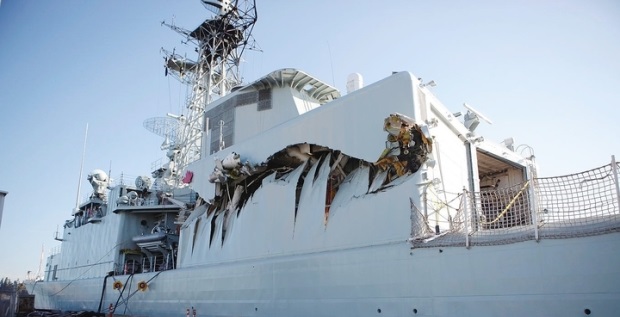Earlier this week, Scott Gilmore wrote a thorough analysis in MacLean’s examining the impact of the Royal Canadian Navy’s (RCN) aging fleet on Canada’s naval capabilities. The results, Gilmore found, are grim.
Some of the RCN’s ships — in particular the Iroquois-class destroyers — have been forced into retirement much earlier than sanguine predictions of a 40+ years life-span had planned for. To even the casual observers of Canada’s navy, Gilmore’s piece should not have come as a surprise. Over the last ten years, a series of unfortunate events led to an already strained fleet being pushed further to its limits. This has not gone unnoticed by Canadian defence commentators.
Former Senator Hugh Segal wrote in 2014 that a failure to revitalize Canada’s naval policy would be an “abdication unbecoming any government.” At the beginning of this year, David Perry and George Petrolekas identified naval policy as a major hurdle facing the defence portfolio in 2015.
Given the severity of the problem and the attention shown to it in the national media, it is surprising that the RCN has not been more prevalent in the preliminary weeks of the national election campaign. In the first leaders debate, hosted this past week by MacLean’s, concerns about the state of the RCN were not raised by any of the candidates. To be fair, only twenty minutes were devoted to foreign and defence policy, and within that wide scope there were many other topics worth discussing. That said, the debate was emblematic of the larger campaign, where naval policy has been treated as the 13th floor of a hotel. A Google search looking for references of “navy” in the election campaign resulted in more articles about the colour of Prime Minister Harper’s blazer during the debate than references to the RCN.
The lack of attention given to naval policy throughout the campaign thus far is rather surprising, given its recent prominence in the media. Both the NDP and the Liberal Party have been publically critical of the delayed procurement process for ships throughout the last Parliament. Gilmore’s article quotes the two parties’ defence critics as saying that naval policy would be a priority if their party assumed government in the fall. Beyond when pressed for comment, however, neither of the three major parties have made a renewed naval policy a central plank in their campaigns. While defence issues routinely rank as a low priority for Canadian voters, there is certainly room for all parties to address naval policy as an issue of good governance. In particular, the two opposition leaders vying to become the next prime minister would be well-served in raising the profile of a policy issue in need of revisiting.
Although it remains unlikely that naval policy will play a larger role in the coming months of the campaign, Canada would benefit from an invigorated debate on the issue. Naval policy might not energize the NDP’s base, but it could quell concerns that the party, having never formed a government, is not experienced enough to run the country.
Indeed, in the 2011 campaign, then-NDP Leader Jack Layton vowed that his party would prioritize RCN shipbuilding over the F-35 procurement. For Trudeau, who’s struggled to define himself on security issues, a focus on the RCN could show he’s committed to a strong defence policy in an area where the Conservatives have faltered. The Conservatives cannot ignore the state of the RCN this campaign if they wish to continue to be seen as the party most adept to defence issues. However, if the Prime Minister’s two adversaries fail to take a serious stand on the matter, naval policy will not be given the attention it’s warranted in the coming campaign.
Election 2015: The RCN needs attention

Battered: The RCN deserves attention from politicians during Election 2015.